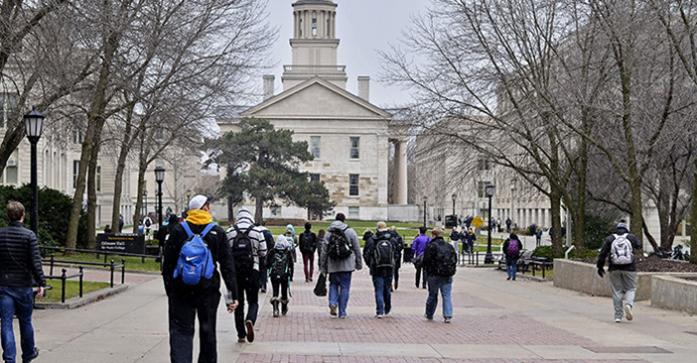By Elianna Novitch
Although the University of Chicago opposes safe spaces and trigger warnings on its campus, the University of Iowa does not have set policies against the ideas.
“Each educational institution is different, but the University of Iowa does not have an official policy on trigger warnings or safe spaces for faculty, students, and staff,” Anne Bassett, the media relations director for UI Strategic Communication, wrote in an email to The Daily Iowan.
The University of Chicago recently sent a letter to incoming students that informed them of its stance against trigger warnings and safe spaces.
In the letter, the University of Chicago Dean of Students John Ellison wrote, “Our commitment to academic freedom means that we do not support so-called ‘trigger warnings,’ we do not cancel invited speakers because their topics might prove controversial, and we do not condone the creation of intellectual ‘safe spaces’ where individuals can retreat from ideas and perspectives at odds with their own.”
When it comes to the use of trigger warnings in classes at the UI, there is no requirement that faculty members use them.
“We’re committed to freedom of expression and respect each faculty member’s right to make her or his own decision about how to handle and facilitate in the classroom, including those who choose to provide a trigger warning,” Bassett wrote in the email.
Though it is at the discretion of faculty members on whether they will choose to give trigger warnings, Nadine Petty, the director of the UI Center for Diversity and Enrichment, said she feels “there would be more harm potentially if they weren’t used, and for that reason people should have the choice and time to prepare for the content they may come across.”
The action by the University of Chicago sparked conversation about the place of safe spaces and trigger warnings across the nation.
Though the phrase “safe space” does not have a firm definition, it can be described as a space in which people of all identities can go to express themselves without having to fear being made uncomfortable or unsafe because of who they are or what they have been through.
“There is a new direction that the [Diversity Center] is moving in, and that is brave spaces as opposed to safe spaces,” Petty said. “We are not always 100 percent safe in designated safe spaces because we can’t assume that every person in the space is a safe person to interact with personally.
“So what we are moving toward is the idea of being courageous enough to be in spaces where we might not be comfortable and to use that discomfort as a learning tool for all involved.”
One reason people and places such as the University of Chicago oppose safe spaces is because of the concern that they can abridge one’s freedom of speech.
“I don’t see safe spaces as a detriment to my free speech,” UI freshman Morgan Parker said. “I think safe spaces are very beneficial for those whose identity is not that of the majority.”
Along with opposing safe spaces, the University of Chicago also took a stance against trigger warnings.
A trigger warning is at the beginning of articles or videos cautions the reader or viewer that the content of a piece may upset or offend some people, especially those who have previously experienced a related trauma.
Petty said that, based on her experience, for certain types of traumas, trigger warnings are extremely important.
“It helps that student make an informed choice about whether they should continue reading or viewing material and that if they do continue, that they can prepare themselves mentally and emotionally for what they may encounter,” she said.
Parker said she feels that the use of safe spaces and trigger warnings are beneficial on the UI campus.
“I think that safe spaces and trigger warnings are important because we are in a really big environment here, and while we can’t expect them everywhere we go in our everyday lives, we should be able to expect to feel safe and not attacked in our educational careers at Iowa,” she said.



